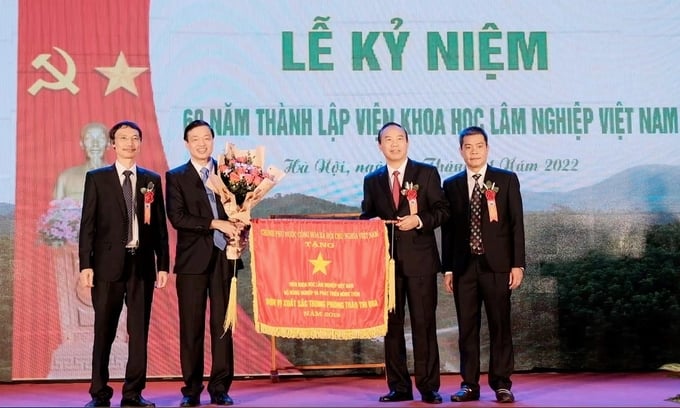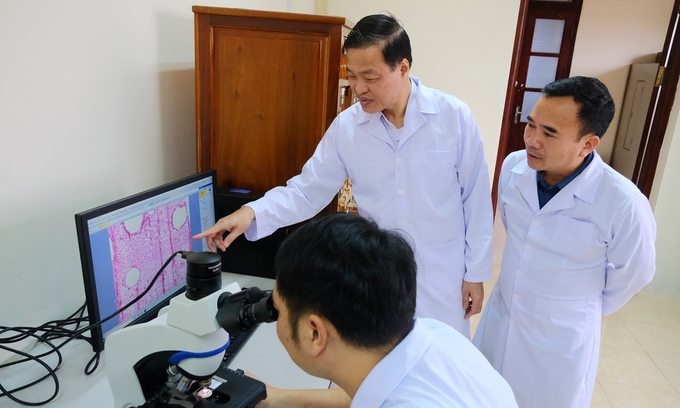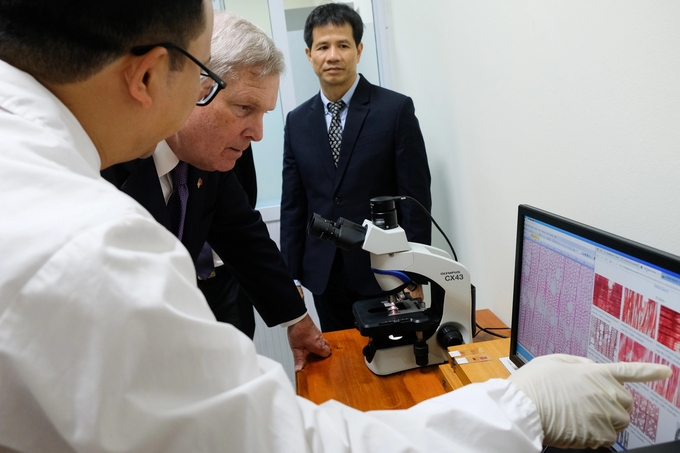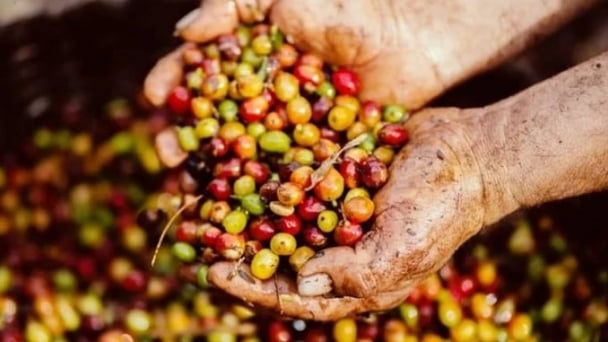June 17, 2025 | 23:30 GMT +7
June 17, 2025 | 23:30 GMT +7
Hotline: 0913.378.918
June 17, 2025 | 23:30 GMT +7
Hotline: 0913.378.918

On the occasion of the 60th anniversary of its establishment, the Vietnamese Academy of Forest Sciences was honored to receive the Government’s Emulation Flag. Photo: Bao Thang.
Under the direction of the Ministry of Agriculture and Rural Development (MARD), over the past 10 years, research in forestry has created many new varieties and technical advances. But in reality, not many of these advances and varieties have been put into practice. This stems from two following main barriers:
The first barrier is that the work of promoting and introducing research results to businesses and users are not effective. This problem is caused by two reasons. Firstly, when deciding to recognize technical advances and new varieties, MARD assigns possession units to be responsible for promoting and transferring them into practice. However, in the current context in which public science and technology organizations are entering into autonomy, the ability and economic potential to organize the transfer are still limited. Secondly, the connection between science organizations, enterprises, and users is not really close. Therefore, the information from the researcher to the manufacturer has not been connected smoothly.
The second barrier concerns scientific products. Scientific products must attain really good quality; otherwise, their applicability in practice will be greatly limited. In the MARD’s direction for the current and upcoming periods, scientific products need to be raised one step. For example, new varieties, besides yield and quality, also need to have resilience and adaptability to climate change. Scientific products should also meet many objectives and requirements in production practice, often called "multi-value integration" by Minister Le Minh Hoan.

Ph.D. Vo Dai Hai at the tissue culture laboratory, Vietnamese Academy of Forest Sciences. Photo: Bao Thang.
Scientists now need to memorize the motto "Research associated with the market". This is an indispensable requirement and demand in production practice because, after all, scientific tasks are derived from practical requirements and serve production practice. To do so, scientists must closely grasp the market’s requirements and work according to the "orders" of the market.
In response to the mentioned requirements, there are two issues that need to be worked on together. First, the management agencies, such as the Department of Science, Technology, and Environment, the Department of Forestry, have to order tasks based on the market's requirements. Second, scientists strengthen, actively explore, and anticipate new trends in production practice. To be able to combine both the management agency side and the scientist side, it is clear that the relationship between the parties needs to be really close.
In the context of the current autonomy mechanism in public science and technology organizations, VAFS has made a drastic change to create jobs for staff while quickly transferring technical advances and scientific results into practice. “Firstly, we signed cooperation agreements with many localities, such as the Quang Ninh People's Committee, the Quang Nam People's Committee, the Lao Cai Department of Agriculture and Rural Development, and the Tuyen Quang Department of Agriculture and Rural Development, and at the same time connected with large corporations such as the Vietnam Rubber Group, the Vietnam Paper Corporation, etc. Through these activities, we quickly grasp the needs of the localities and partners and coordinate to implement the work on sustainable forest management and forest certification,” said Ph.D. Vo Dai Hai.

PhD. Vo Dai Hai and Director of Forest Industry Research Institute Bui Duy Ngoc observe wood specimen in the inspection room. Photo: Bao Thang.
At the same time, the Institute is also proactive in planning to introduce research results on varieties and technical advances in working sessions with localities. Mentioning this work, PhD. Vo Dai Hai expressed, "By doing this, we really feel like we are being encouraged and inspired by the locality, businesses, and organizations that are lacking a lot of scientific information as well as development policies for forestry. The coordination gradually goes into depth and brings clear effects."
In the process of making policies for forestry development, the institute's scientific staff is directly involved in discussions and local support. Through such exchanges, the two sides understand each other better, creating cohesion. The evidence for cooperation between the two sides is that many models of plantation forests, especially the model of growing indigenous plants at the locality, have been transferred and well implemented by the Institute. Models of multi-use forests, large timber forests, and non-timber forest products have also been deployed.
In addition, VAFS also listens to the locality’s concerns, especially in terms of forest economic development, sustainable forest management, and certification. On that basis, the Institute has proposed to MARD the development of a forest certification system in Vietnam. From a place with about 200,000 ha of certified forest, Vietnam now has approximately 400,000 ha, exceeding many initial expectations.
According to the Vietnam Forestry Development Strategy issued by the Prime Minister in 2021, Vietnam strives to reach 500,000 ha of certified forest by 2025. With the above progress, the set target is thus completely feasible. At the same time, the achieved result proves once again that research according to the needs of the market is an unchangeable path for research institutes to step in and stand firm under the autonomy mechanism. The development of Vietnam's forestry sector in the coming years will certainly have innovations.

US Secretary of Agriculture Thomas Vilsack visits the recently inaugurated timber inspection center located at the Vietnamese Academy of Forest Sciences. Photo: Tung Dinh.
Entering the autonomy mechanism, difficulties and obstacles can be seen in any work, but VAFS is always deeply aware that staff training must be maintained and developed. If the staff is good, the unit will be strong and perform the assigned tasks well.
That is not only the institute’s thought but also its throughout action motto. "Despite the financial challenges, we do not limit sending our staff for domestic and overseas training. The result is that in the past, the institute’s number of staff at doctoral level was around 30 people, but thanks to the attention and drastic direction of generations of leaders, the number of doctors has increased 3.5 times, up to 112 people now," said the Director of the Vietnamese Academy of Forest Sciences.
The institute's approach is based on two main forms: long-term training through cooperation with many countries and international organizations to send staff to study abroad, and staff exchange in international seminars or short-term training. In parallel, there are regular master's and doctoral training programs in the country.
VAFS has a long history of doctoral training, which has been assigned by the Ministry since 1982. Over the past 40 years, the Institute has paid special attention to training work, from perfecting regulations to preparing teaching and guiding staff. We also have a mechanism to favor, attract, and support PhD students to work in key areas of the forestry industry, helping to directly supplement local staff and provide core staff for the whole sector.
Thanks to the prestige of the doctoral evaluation committee organized by the Institute, staff trained at the Vietnamese Academy of Forest Sciences have been promoting their abilities well; most of them become leading scientists, key officials, or leaders of units and localities.
Ph.D. Vo Dai Hai said that the VAFS currently has 17 dependent units stretching from north to south and managing more than 11,700ha. In particular, the Institute has a laboratory system with many modern pieces of equipment, including a Wood Material and Technology Laboratory that meets Vilas national standards for wood inspection.
Over its 60 years of operation, the Institute has carried out nearly 1,200 scientific research projects at all levels. In particular, the Institute has always been the leading forest transplant facility in the country, accounting for over 90% of the recognized forest plant varieties.
Translated by Huyen Vu
![Turning wind and rain into action: [7] Early disaster warnings help marine farmers minimize losses](https://t.ex-cdn.com/nongnghiepmoitruong.vn/608w/files/news/2025/06/17/z6704423696987_15fd32ffc26d590d204d520c9dac6786-nongnghiep-142942.jpg)
(VAN) In recent years, thanks to early disaster warnings and forecasting, marine farmers in Khanh Hoa province have been able to reduce risks and losses, thereby improving production efficiency.
![Turning wind and rain into action: [6] ‘Four on-the-spot’ disaster management software](https://t.ex-cdn.com/nongnghiepmoitruong.vn/608w/files/news/2025/06/17/e5a48259d6a262fc3bb3-nongnghiep-183800.jpg)
(VAN) By simply activating the scenario on the disaster management software, the relevant authorities immediately know how many households need to be evacuated, where to evacuate them to, and by what means of transportation…
![Turning wind and rain into action: [5] Hue applies modern technology in disaster forecasting](https://t.ex-cdn.com/nongnghiepmoitruong.vn/608w/files/news/2025/06/17/z6704423696987_15fd32ffc26d590d204d520c9dac6786-nongnghiep-093938.jpg)
(VAN) In Hue city, modern technology has recently been applied in meteorological and hydrological forecasting and warning, helping to reduce the damage caused by natural disasters.

(VAN) A cutting-edge farming technique being implemented on an experimental ranch in Arizona's Sonoran Desert has already saved a billion gallons of water over five years, according to Civil Eats.

(VAN) Poultry and pig production and the environment can be boosted through enhanced water technology, according to new research.

(VAN) Coffee prices on June 16, 2025 are unchanged. In Vietnam, local trading prices are holding steady, ranging around VND 112,000 – VND 112,500/kg.
![Turning wind and rain into action: [4] Bringing climate bulletins to remote and isolated areas](https://t.ex-cdn.com/nongnghiepmoitruong.vn/608w/files/linhnhp/2025/06/14/1152-z6704423696987_15fd32ffc26d590d204d520c9dac6786-nongnghiep-151141.jpg)
(VAN) The Vietnam Agriculture and Nature Newspaper interviewed Mr. Vu Thai Truong, Acting Head of Climate Change and Environment at UNDP Vietnam, to gain deeper insight into how climate bulletins are delivered to farmers.